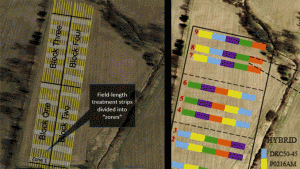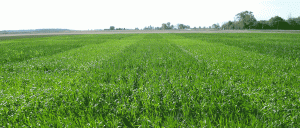More than stress
FARMERS STRUGGLE WITH MENTAL HEALTH

FOR MANY FARMERS, recent crop years haven’t been easy ones — and while many will first worry about the impact weather, markets, and regulations may have on their crops and how they can be managed — many will not also consider the toll constant stress has on their mental and physical well-being.
A recent survey conducted by the University of Guelph studied the state of mental health in Canadian producers. Andria Jones-Bitton, D.V.M., Ph.D., and her team measured the levels of perceived stress, anxiety and depression, burnout, and resilience of 1,132 producers across all commodity groups across Canada.
COMMON PROBLEM
“Mental health issues in rural populations are quite common, with farmers in several countries having higher levels of mental illness and suicide than in other occupations,” says Jones-Bitton. “Anxiety, depression, and stress are higher than the general population, and resilience levels lower.
The study revealed that 45% of surveyed producers were classified in the high stress category, and reported higher levels of anxiety and depression than in comparison groups. Burnout, which refers to the belief that one can continue to do their job well, was measured in three sub-scales. More than half of producers had high expectations for continued expectations at work, but one-third scored high in emotional exhaustion, and 40% scored high in cynicism. Resilience scores were also lower than the average population, which can increase risk for depression and anxiety.
Causes of stress, anxiety, and depression include government regulations, weather/ changing climate, animal disease outbreaks, feeling scrutinized or under attack by the public, succession planning, and significant financial burdens.
“I have heard lots of anecdotal stories from farmers coming to my elevator about the rough year they had last year that’s continued in to this year,” says Donna Archer, who owns a commercial grain elevator with her husband in Campbellford, Ontario. “This year in particular it hasn’t just been the odd person coming in frustrated; any farmer with any crop is frustrated that they can’t get their seeds in the ground, or that they have to change plans or plant later.”
Dr. Jason Ramsay, C.Psych., an adult clinical and counselling psychologist at Niagara Psychological Wellness and member of the Ontario Psych. Association Board of Directors, stresses the importance of mental well-being.
“Poor mental health has a profound impact on someone’s everyday life. At some point in their lives, everyone may struggle with some aspect of mental health, but if issues don’t resolve when a situation improves, more help is needed. It’s also a huge impact on the rest of the body — for instance, depression always comes with sleeping problems. Since farmers don’t have a choice but to work, they would rely on extra adrenaline to keep going, which can lead to physical problems, increased risk of physical injury, poor healing.”
He says physical injuries and depression often go hand-in-hand, which would make it more difficult to perform work, which can again lead to further anxiety or worsening depression.
“It’s important to stress in a healthy way,” says Ramsay. “The world has lots of stress, but promoting healthy stress responses is crucial to promote physical and mental health.”
GETTING HELP
Fortunately, producers have an overall positive attitude towards seeking help. However, 45% would feel uneasy seeking help due to other’s perceptions, and may experience difficulty accessing help due to their rural location.
According to Ramsay, access to treatment is the biggest barrier to receiving proper care.
“Psychologists aren’t covered by OHIP. Most people will go to their family physician, who will typically prescribe medication, but not provide psychotherapy or know of a psychologist or treatment provider in the community that does. Most general practitioners aren’t well trained in handling specific mental health problems. Family health teams can include social workers or group therapy, but then comfort level in those environments can be an issue.”
Ramsay says educating family doctors, psychiatrists, psychologists, and allied mental health providers in agriculture, especially those in rural settings, would make a big difference. Even better, he says — insurance should cover psychological treatment.
“We are fortunate to live in a connected world, which can make it easy to get social support in tough times. Social media is easy to access and opens up a world of communication, and can be a good way to find out how to access help. Remote therapy via a secure telehealth app or link has also proven to be very effective, and may be a good tool to reach rural audiences.”
New research is now being conducted by the University of Guelph as a result of the survey. According to Jones-Bitton, phase two will include one-on-one interviews with Ontario farmers to explore mental health on-farm, as well as discover what supports they currently use and what support they want to see. A new agriculture-specific mental health literacy program will be developed to educate the industry on common mental health issues and promote communication around these issues. The program will be developed in Ontario, then used on a national scale. Lastly, Jones-Bitton hopes to develop an emergency response model as a resource on how to quickly respond to producer mental health when a crisis hits.
“There’s definite room for improvement when it comes to producer mental health as well as producer mental health support,” says Jones-Bitton. “We want to develop and make accessible the tools and resources that producers need to get help.”
If you or someone you know is struggling with mental health, please visit www.psych.on.ca, www.mentalhealthhelpline.ca, or www.cmha.ca/get-involved/find-your-cmha/. •


























